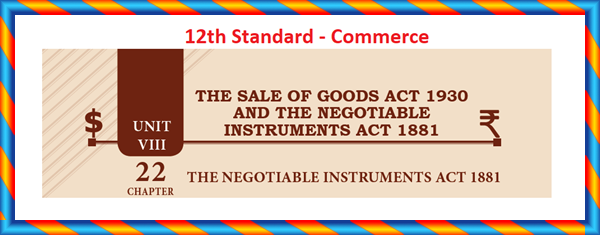Tamil Nadu Board 12th Standard Commerce - Chapter 22: Book Back Answers and Solutions
This post covers the book back answers and solutions for Chapter 22 – Commerce from the Tamil Nadu State Board 12th Standard textbook. These detailed answers have been carefully prepared by our expert teachers at KalviTips.com.
We have explained each answer in a simple, easy-to-understand format, highlighting important points step by step under the relevant subtopics. Students are advised to read and memorize these subtopics thoroughly. Once you understand the main concepts, you’ll be able to connect other related points with real-life examples and confidently present them in your tests and exams.
By going through this material, you’ll gain a strong understanding of Commerce Chapter 22 along with the corresponding book back questions and answers (PDF format).
Question Types Covered:
- 1 Mark Questions: Choose the correct answer, Fill in the blanks, Identify the correct statement, Match the following
- 2 Mark Questions: Answer briefly
- 3, 4, and 5 Mark Questions: Answer in detail
All answers are presented in a clear and student-friendly manner, focusing on key points to help you score full marks.
All the best, Class 12 students! Prepare well and aim for top scores. Thank you!
Chapter 22: The Negotiable Instruments Act 1881
I. Choose the correct answer.
1. Negotiable Instrument Act was passed in the year ______.a) 1981
b) 1881
c) 1994
d) 1818
Answer Key:
b) 1881
2. Number of parties in a bill of exchange are
a) 2
b) 6
c) 3
d) 4
Answer Key:
c) 3
3. Section 6 of Negotiable Instruments Act 1881 deals with
a) Promissory Note
b) Bills of exchange
c) Cheque
d) None of the above
Answer Key:
c) Cheque
4. _______ cannot be a bearer instrument.
a) Cheque
b) Promissory Note
c) Bills of exchange
d) None of the above
Answer Key:
b) Promissory Note
5. A cheque will become stale after _____ months of its date:
a) 3
b) 4
c) 5
d) 1
Answer Key:
a) 3
II. Very short answer questions.
1. What is meant by Negotiable Instrument?Answer Key:
- The word ‘Negotiable’ means transferable from one person to another in return for consideration.
- The word ‘Instrument’ means a written document by which a right is created in favor of certain person.
2. List three characteristics of a Promissory Note.
Answer Key:
- A promissory note originally made payable to bearer is illegal.
- The sum payable must be certain and must be specified in the note itself.
- A bank note or a currency note is not a promissory note.
3. What is a meant by Cheque?
Answer Key:
- According to section 6 of the Negotiable Instruments Act, 1881.
- A Cheque as “a bill of exchange drawn on a specified banker and not expressed to be payable otherwise than on demand”
III. Short answer questions.
1. Distinguish between Negotiability and Assignability. (any 3)Answer Key:
|
Basis
of Difference
|
Negotiability
|
Assignability
|
|
Legal
Ownership
|
It passes to
the transferee by bearer instrument and by endorsement and delivery in the
case of an order instrument.
|
An assignment
can be made by observing certain formalities.
|
|
Notice
|
Notice is not
necessary for the holder of negotiable instrument to claim the payment from
debtor.
|
In case of
actionable claim, notice of the assignment by the transferee regarding the
transfer of debt to the debtor is necessary.
|
|
Consideration
|
Consideration
is presumed.
|
The assignee
has to prove the consideration for the transfer.
|
2. What are the characteristics of a bill of exchange? (any 3)
Answer Key:
- A bill of exchange is a document in writing.
- The document must contain an order to pay.
- The order must be unconditional.
- The instrument must be signed by the person who draws it.
3. Draw the two different types of crossing.
Answer Key:

IV. Long answer questions.
1. Distinguish a cheque and a bill of exchange. (any 5)Answer Key:
|
Basis
of Difference
|
Cheque
|
Bill of Exchange
|
|
Payabillity
|
It is payable
on demand only.
|
It is payable
on demand or on the expiry of a certain period.
|
|
Notice
|
Notice is not
necessary for a cheque.
|
When a bill
is dishonoured, notice of dishonour is necessary.
|
|
Sets
|
It is not so
in case of cheque.
|
Foreign bills
of exchange are drawn in sets of three.
|
|
Discounting
|
A cheque
cannot be discounted.
|
A bill can be
discounted with a bank.
|
|
Stamping
|
Cheques need
not be stamped.
|
Bills are to
be sufficiently stamped.
|
|
Currency
|
A cheque is
payable only in home currency.
|
A bill can be
drawn and payable in any currency.
|
2. Discuss in detail the features of a cheque. (any 5)
Answer Key:
Instrument in Writings:
- A cheque or a bill or a promissory note must be an instrument in writing.
- The instrument must contain an order to pay money.
- The cheque is always drawn on a specified banker.
- The order must be for payment of only money.
- The cheque is to be signed by the drawer.
- A cheque is always payable on demand.
3. What are the requisites for a valid endorsement? (any 5)
Answer Key:
- Endorsement is to be made on the face of the instrument or on its back.
- Endorsement for only a part of the amount of the instrument is invalid.
- Endorsement is complete only when delivery of the instrument is made.
- Signing in block letters does not constitute regular endorsement.
- Endorsement must be in link
PG ASST COMMERCE
MKVK MATRIC HR SEC SCHOOL
TENKASI










0 Comments:
Post a Comment